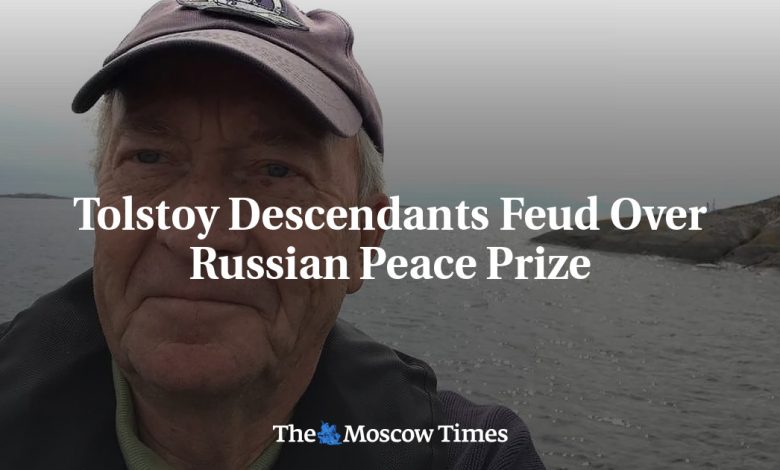Tolstoy Descendants Feud Over Russian Peace Prize

A new peace prize backed by Russian President Vladimir Putin bearing Leo Tolstoy’s name has divided the writer’s descendants, bringing to mind the unhappy families of his novel “Anna Karenina.”
At the famed Bolshoi Theatre in Moscow, the first Leo Tolstoy International Peace Prize was awarded on September 9 to the African Union, in the presence of numerous high-profile Russians.
Leo Tolstoy “would turn and turn and turn in his grave” if he knew, “but hopefully he can’t hear anything,” his great-grandson Stephan Tolstoy told AFP in an interview in Stockholm.
An elegant 83-year-old Swedish national, he has been fuming since he learned about the initiative.
His ancestor was a fervent pacifist opposed to all forms of state and government. He is well-known for recounting his experience as a soldier during the Siege of Sevastopol in the Crimean War in 1854-1855.
“It is a peace prize. And I think it’s perfect to link it to the name of Leo Tolstoy. There’s nothing wrong with that,” Stephan Tolstoy said. “The problem is that it is initiated by a country at war and invading another country,” he said, referring to Russia’s invasion of Ukraine.
“And that makes it more complicated. A little bit disturbing,” he added.
Tool of influence
The Tolstoy Prize helps contribute to the “formation of the new just multipolar world order,” Russian President Vladimir Putin said in a statement accompanying the prize’s announcement.
The selection of the African Union as its first laureate was likely a strategic choice, as Russia vies to expand its influence over the continent.
In this power struggle with the West, the Kremlin has recruited the “War and Peace” author’s great-great-grandson, Vladimir Tolstoy, as a board member for the prize.
Leo Tolstoy “was always in favor of a just world,” Vladimir Tolstoy told Russian state-run television Channel One in June.
“Tolstoy’s descendants live all over the world and have supported this initiative,” said the former presidential adviser on cultural affairs and head of the Tolstoy Museum in Moscow.
“No!” said his distant cousin in Stockholm. “It was said that the members of the Tolstoy family were asked in advance, and certainly we were not,” he said.
“Before the invasion, I had quite a good relationship with [Vladimir Tolstoy],” said Stephan Tolstoy. “We haven’t had any discussions or contact since the war started, unfortunately.”
In another sign of the deep split, the once-packed family reunions that Vladimir Tolstoy would organize every two years at Leo Tolstoy’s Yasnaya Polyana estate are now ancient history.
Nobel copycats
The Tolstoy Prize has little chance of overshadowing the most prestigious award in the field, the Nobel Peace Prize — which Tolstoy himself was thrice nominated for.
Since it was first awarded in 1901, the Nobel — whose winners will be announced this year from October 7-14 — has inspired numerous copycats, including some outright competitors.
In 1949, at the start of the Cold War, the Stalin Peace Prize — later renamed the Lenin Peace Prize — saw itself as an alternative to the Nobel and was presented until the Soviet Union collapsed.
Among its numerous laureates were Chilean poet Pablo Neruda, French author Louis Aragon, Spanish painter Pablo Picasso, Soviet leaders Nikita Khrushchev and Leonid Brezhnev, as well as Cuban leader Fidel Castro.
After the Nobel went to Chinese dissident Liu Xiaobo in 2010, a Confucius Peace Prize was also introduced in China and awarded for a few years, to Vladimir Putin, Fidel Castro and Zimbabwean president Robert Mugabe, among others.
Meanwhile, in Oslo, the Norwegian Nobel Institute aims to steer clear of any controversy when the Peace Prize is awarded on October 11.
“There are more than 300 peace prizes in the world and we wish all of them welcome and all the best,” its director Olav Njolstad told AFP.
“We are pretty confident that the Nobel Peace Prize stands out as … the most prestigious peace prize in the world, and that I say without any criticism of the other prizes,” he added.
A Message from The Moscow Times:
Dear readers,
We are facing unprecedented challenges. Russia’s Prosecutor General’s Office has designated The Moscow Times as an “undesirable” organization, criminalizing our work and putting our staff at risk of prosecution. This follows our earlier unjust labeling as a “foreign agent.”
These actions are direct attempts to silence independent journalism in Russia. The authorities claim our work “discredits the decisions of the Russian leadership.” We see things differently: we strive to provide accurate, unbiased reporting on Russia.
We, the journalists of The Moscow Times, refuse to be silenced. But to continue our work, we need your help.
Your support, no matter how small, makes a world of difference. If you can, please support us monthly starting from just $2. It’s quick to set up, and every contribution makes a significant impact.
By supporting The Moscow Times, you’re defending open, independent journalism in the face of repression. Thank you for standing with us.
Continue
Not ready to support today?
Remind me later.
×
Remind me next month
Thank you! Your reminder is set.

